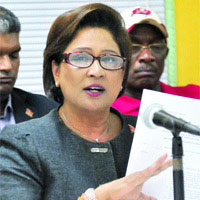PORT OF SPAIN, (Reuters) – Lawmakers in Trinidad and Tobago approved a three-month extension of a state of emergency yesterday after Prime Minister Kamla Persad-Bissessar said it had averted “a criminal uprising” in the energy-rich country.

The measure, suspending some constitutional guarantees and giving the police and military sweeping powers to make arrests, was first declared on Aug. 21 and had been due to expire on Monday.
Parliament approved the three-month extension with a simple majority vote after Persad-Bissessar said the “criminal underworld” was bent on sowing “bloodshed and mayhem” in the south Caribbean country.
Trinidad, a leading exporter of liquefied natural gas to the United States, has faced a growing crime problem stemming from heavily armed street gangs.
Members of the opposition People’s National Movement voted against the extension of the emergency rule, saying it was unfairly targeting black communities in the twin-island nation, which is divided almost equally between descendants of black Africans and East Indians.
But Persad-Bissessar told a parliamentary debate the emergency, which has led to more than 1,400 arrests so far, was strictly aimed at halting runaway crime.
It was clamped on the country after police blamed a recent spate of murders on the drug trade and turf wars over smuggling routes through Trinidad and Tobago, which is a trans-shipment point for South American cocaine headed to Europe and the United States.
In her comments to parliament, Persad-Bissessar said the emergency was also required to prevent violent reprisals against the police and other authorities for recent drug seizures in Trinidad.
“The nation had been saved from a criminal uprising of untold proportions. That did not occur. It was stopped in its tracks with the state of emergency,” Persad-Bissessar said.
“The threat to public safety, law and order was real and imminent. The planned retaliation by the gangs involved in the drug trade represented a clear and present danger to national security and innocent law-abiding citizens of this country,” she said.





